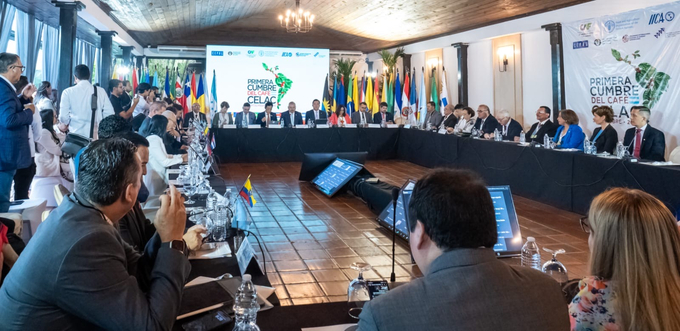November 27, 2025 | 16:42 GMT +7
November 27, 2025 | 16:42 GMT +7
Hotline: 0913.378.918
November 27, 2025 | 16:42 GMT +7
Hotline: 0913.378.918

The CELAC Fair and Permanent Coffee Forum will continue until Thursday with the theme ‘Agriculture and Family Economy for Regional Development'.
At the opening of the first Fair and Permanent Coffee Forum in Honduras, QU Dongyu, Director-General of the Food and Agriculture Organization of the United Nations (FAO), emphasized the critical need to exchange knowledge and transform the coffee sector into a more efficient, inclusive, resilient, and sustainable industry.
Amid numerous complex and interconnected challenges facing the world such as food insecurity, the climate crises, and increasing geopolitical tensions, the coffee sector, with a global production value of approximately $15 billion annually, can play a crucial role in many contexts related to the global transformation of agrifood systems, Qu explained.
Smallholder producers account for a large share of global output, and coffee exports represent a vital source of revenue for many low-income countries. “But the coffee sector faces several challenges that need urgent attention such as loss of biodiversity, pests and diseases and high price volatility, among others,” he warned.
Organized by the Community of Latin American and Caribbean States (CELAC), the Coffee Forum features representatives from almost all 33 member countries of the regional bloc, currently presided over by Honduras. Some of the world's finest coffee beans are being showcased and opportunities are being provided to establish commercial alliances and explore the development of the coffee sector within the region.
The Director-General commended Honduras and other coffee-producing countries of the region such as Brazil, for securing the endorsement of an International Coffee Day during the recent 76th Session of the FAO Committee on Commodity Problems. The Committee’s recommendation will be considered by the United Nations General Assembly later this year, he informed.
The sector in Honduras
Honduras, the largest coffee producer in Central America and the Caribbean, and ranked among the top 10 globally, is deeply reliant on its coffee industry. This sector plays a vital role in the country's economy, generating jobs, export revenues, and supporting the livelihoods of smallholder farmers. With over 90% of Honduras' coffee output exported, it also serves as a crucial source of foreign exchange.
“To enable the coffee sector to leverage its potential, it is crucial to prioritise impactful solutions, the FAO Director-General said, identifying some key priorities.”
Among them, modernizing infrastructure and technology through investments in advanced coffee processing facilities, marketing channels, and transportation networks to enhance bean quality and reduce post-harvest losses.
Qu also spoke about promoting climate-resilient farming practices—such as shade-grown coffee and agroforestry—to safeguard crops against extreme weather, pests, and improve soil health, and invited Honduras to focus on climate adaptation measures.
Similarly, he highlighted the importance of strengthening the coffee value chain by building a strong national brand and expanding international trade relationships to increase value addition and raise the small-holder farmer incomes. Finally, he explained that empowering coffee growers with training on best practices, access to credit, and market insights is essential for long-term success.
Qu reaffirmed FAO's readiness to work with the Honduran government to provide technical support for transforming the coffee sector. He urged continued collaboration to achieve tangible improvements in the industry.
“I will be here to support this historical mission, which is part of FAO's mandate to promote value chains for smallholder farmers and build a better future,” he concluded.
The CELAC Fair and Permanent Coffee Forum will continue until Thursday with the theme ‘Agriculture and Family Economy for Regional Development'.
(FAO)

(VAN) A new study reveals how the simultaneous effects of ocean acidification, salinity and loss of oxygen are making the world more fragile.

(VAN) Hopes are growing that the creation of the first 3D turkey gut model could be a turning point in the battle against the virulent blackhead disease.

(VAN) Tyson, America’s biggest meat supplier, plans to shutter one of its largest beef processing plants as the industry continues to struggle with low cattle supplies and political pressure from Washington.

(VAN) New FAO study shows how digital solutions are empowering farmers and fishers to prevent losses and build resilient agrifood systems.

(VAN) Brazil's COP30 presidency pushed through a compromise climate deal on Saturday that would boost finance for poor nations coping with global warming but that omitted any mention of the fossil fuels driving it.

(VAN) Poultry farmers in the UK have been warned that they could face one of the worst winters yet for bird flu.

(VAN) Prices of main-crop paddy have risen sharply, with jasmine rice hitting 16,100 baht per tonne — the highest level in years.